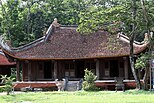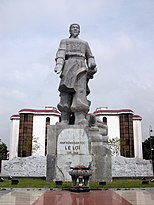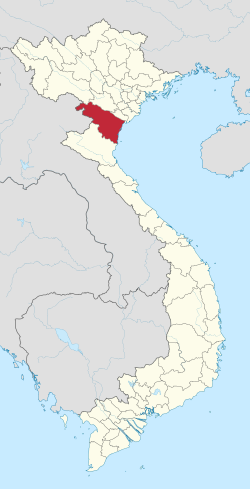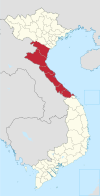| Thanh Hóa | |
|---|---|
| Province | |
             Citadel of the Hồ Dynasty • Sông Mực Lake • Hải Hòa Beach • Trống Mái Mountain • Cẩm Lương fish stream • Mai An Tiêm Temple • Lam Kinh Temple • Phú Lệ Suspension bridge • Bà Triệu Temple • Dạ Lộc Temple • Lê Lợi Mausoleum • Lê Lợi Statue Citadel of the Hồ Dynasty • Sông Mực Lake • Hải Hòa Beach • Trống Mái Mountain • Cẩm Lương fish stream • Mai An Tiêm Temple • Lam Kinh Temple • Phú Lệ Suspension bridge • Bà Triệu Temple • Dạ Lộc Temple • Lê Lợi Mausoleum • Lê Lợi Statue | |
 Seal Seal | |
 Location of Thanh Hóa within Vietnam Location of Thanh Hóa within Vietnam | |
| Coordinates: 20°0′N 105°30′E / 20.000°N 105.500°E / 20.000; 105.500 | |
| Country | |
| Region | North Central Coast |
| Capital (and Largest city) | Thanh Hóa |
| Government | |
| • People's Council Chair | Lại Thế Nguyên |
| • People's Committee Chair | Đỗ Minh Tuấn |
| Area | |
| • Total | 11,114.71 km (4,291.41 sq mi) |
| Population | |
| • Total | 4,783,500 |
| • Density | 430/km (1,100/sq mi) |
| Demographics | |
| • Ethnicities | Vietnamese, Mường, Thai, Thổ, Dao, and H'Mông |
| GDP | |
| • Total | VND 146.242 trillion US$ 6.351 billion |
| Time zone | UTC+7 (ICT) |
| Area codes | 237 |
| ISO 3166 code | VN-21 |
| HDI (2020) | (23th) |
| Website | www |
Thanh Hóa is the northernmost coastal province in the North Central Coast region of Central Vietnam. It borders Sơn La, Hòa Bình, and Ninh Bình to the north, Nghệ An to the south, the Laotian province of Houaphanh to the west with a boundary of over 192 kilometres (119 mi) long, and the South China Sea (Gulf of Tonkin) to the east.
Thanh Hóa is a relatively large province; it ranks fifth in area and third in population among 63 central administrative subdivisions. Its capital and largest city is Thanh Hóa City. The province has a nickname: Xứ Thanh (The Land of Thanh).
Human civilization has existed in Thanh Hóa since about 6,000 years ago and was one of the earliest centers of the ancient Vietnamese. Archaeological excavations have shown that the first culture present was the Đa Bút Culture, located along the Đáy and the Mã Rivers.
Thanh Hóa is located in the middle of North Vietnam and the North Central Coast as a transition in many aspects: geology, climate, administrative division, and local culture. These factors show that it has many particular local habits, customs, and cultures.
Thanh Hóa has two provincial cities, one district-level town and 24 rural districts with an area of 11,114.71 km (4,291.41 sq mi), and a population of approximately 3.6 million. Sầm Sơn city is a famous seaside resort situated 16 km from the Thanh Hóa city centre. Bỉm Sơn township is a large industrial centre, especially for cement. Nghi Sơn is a promising economic zone, expected to become the centre of Thanh Hoa's industry with a large refinery factory, deepwater seaport, and many projects in progress.
The province is also home to many ethnic groups, the seven ethnicities with most people are Kinh, Mường, Thái, H'Mông, Dao, Thổ, Khơ-mú with mentions of the legend Long Quân. ("Dragon Lord of Lac")
Geography
Geographic position
The coordinate was accurately measured as 19°18'N - 20°40'N (from the southernmost point to northernmost point), 104°22'E - 106°05'E (from the westernmost point to easternmost point).
Administrative divisions

Thanh Hóa is subdivided into 26 district-level sub-divisions:
- 22 rural districts:
- 2 district-level towns:
They are further subdivided into 28 commune-level towns (or townlets), 579 communes, and 30 wards.
Title
Thanh Hóa province is the hometown of many emperors in history, so Valedictorian-Fine Artist Vũ Tú personally gave this province the title "King" Region of Vietnam (Vietnamese: Miền quân vương nước Việt).
Etymology
The province's name derives from Sino-Vietnamese 清化.
清 "Thanh" meaning clear; pure; fine. 化 "Hóa" meaning “to transform; to change into; to become”.
External links
References
- ^ Biểu số 4.3: Hiện trạng sử dụng đất vùng Bắc Trung Bộ và Duyên hải miền Trung năm 2022 [Table 4.3: Current land use status in the North Central and South Central Coast regions in 2022] (PDF) (Decision 3048/QĐ-BTNMT) (in Vietnamese). Ministry of Natural Resources and Environment (Vietnam). 18 October 2023. – the data in the report are in hectares, rounded to integers
- , Result from Vietnam's 2019 population and housing census
- "Tình hình kinh tế, xã hội Thanh Hóa năm 2018". Cục Thống kê tỉnh Thanh Hóa. Retrieved 10 May 2020.
- "Human Development Index by province(*) by Cities, provincies and Year". General Statistics Office of Vietnam. Retrieved September 28, 2024.
- Memoir of 4 years studying Physics at Hong Duc University (Vietnam) - Vũ Tú
| Places adjacent to Thanh Hóa province | ||||||||||||||||
|---|---|---|---|---|---|---|---|---|---|---|---|---|---|---|---|---|
| ||||||||||||||||
| 2 provincial cities, 2 district-level towns, 22 districts 32 commune-level towns, 63 wards, 452 communes | ||
| Thanh Hóa city (capital) |
|  |
| Sầm Sơn city |
| |
| Bỉm Sơn town |
| |
| Nghi Sơn town |
| |
| Bá Thước district |
| |
| Cẩm Thủy district |
| |
| Hà Trung district |
| |
| Hậu Lộc district |
| |
| Hoằng Hóa district |
| |
| Lang Chánh district |
| |
| Mường Lát district |
| |
| Nga Sơn district |
| |
| Ngọc Lặc district |
| |
| Như Thanh district |
| |
| Như Xuân district |
| |
| Nông Cống district |
| |
| Quan Hóa district |
| |
| Quan Sơn district |
| |
| Quảng Xương district |
| |
| Thạch Thành district |
| |
| Thiệu Hóa district |
| |
| Thọ Xuân district |
| |
| Thường Xuân district |
| |
| Triệu Sơn district |
| |
| Vĩnh Lộc district |
| |
| Yên Định district |
| |
| Districts of North Central Coast of Vietnam | ||
|---|---|---|
| Thanh Hóa province |  | |
| Nghệ An province | ||
| Hà Tĩnh province | ||
| Quảng Bình province |
| |
| Quảng Trị province | ||
| Huế |
| |
| denotes provincial seat. | ||
| Subdivisions of Vietnam | |||||||||||||||||
|---|---|---|---|---|---|---|---|---|---|---|---|---|---|---|---|---|---|
| Municipalities |
| ||||||||||||||||
| Provinces |
| ||||||||||||||||